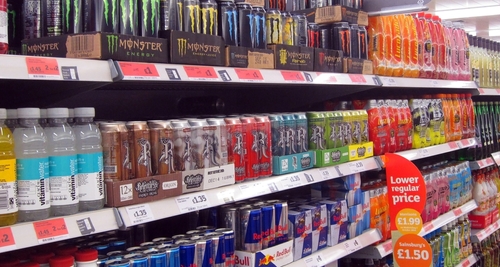|
Getting your Trinity Audio player ready...
|
The Hidden Dangers of Energy Drinks: What You Need to Know About Cardiovascular Health
Edited by: TJVNews.com
Energy drinks have become a staple for many seeking a quick boost of energy to combat fatigue and stay alert. These carbonated beverages, often marketed as the perfect solution for late-night study sessions, demanding workdays, or intense workouts, promise to deliver a surge of energy and enhanced focus. However, the New York Post reported that recent research has illuminated a darker side to these popular drinks, revealing serious health risks that could outweigh their temporary benefits.
Energy drinks typically contain a potent combination of refined sugar and high levels of caffeine. While these ingredients can effectively stave off drowsiness and improve concentration, they come with significant downsides. The high sugar content not only contributes to the erosion of teeth but also poses long-term risks to mental health. According to the information provided in The Post report, studies have linked the consumption of energy drinks to an increased risk of mental health issues, including attention-deficit hyperactivity disorder (ADHD), depression, anxiety, and even suicidal thoughts, particularly in younger consumers.
One of the most alarming findings concerns the impact of energy drinks on cardiovascular health. Ingredients such as taurine and guarana, common in many energy drinks, have been shown to disrupt cardiovascular function, as was reported by The Post. This disruption can lead to arrhythmia, or an irregular heartbeat, which significantly raises the risk of cardiac arrest.
A recent study by researchers at the Mayo Clinic examined the case studies of 144 patients who survived sudden cardiac arrest. The Post report indicated that they found that approximately 5% of these survivors had consumed an energy drink prior to their life-threatening episode. Although this percentage might seem small, it underscores a potential risk that should not be ignored.
Dr. Michael J. Ackerman, the lead author of the study and a genetic cardiologist at the Mayo Clinic, cautions that while the relative risk is small, the absolute risk of sudden death after consuming an energy drink is even smaller, the report in The Post said. Nonetheless, he advises patients with known genetic heart diseases that predispose them to sudden death to carefully consider the risks and benefits of consuming such drinks.
Professor Peter Schwartz, director of Italy’s Center for Cardiac Arrhythmias of Genetic Origin and Laboratory of Cardiovascular Genetics, supports these findings. The Post reported that he emphasized that the observed risks are not merely coincidental but indicate a genuine association between energy drink consumption and serious health issues. Schwartz’s stance further solidifies the argument that these beverages pose a tangible risk to heart health, especially for individuals with pre-existing conditions.
For the average consumer, the occasional energy drink may seem harmless, but these findings suggest that regular consumption can lead to significant health problems, the Post report noted. The immediate benefits of increased alertness and energy are overshadowed by the potential for long-term harm, including dental issues, mental health problems, and severe cardiovascular events.
Given the evidence, it is crucial for individuals, particularly those with underlying health conditions, to weigh the risks and benefits of energy drinks. Alternatives such as natural stimulants, healthy sleep habits, and balanced diets can provide safer ways to maintain energy levels without jeopardizing health.
Caffeine Content: A Comparative Analysis
Caffeine is a key ingredient in energy drinks and is also found in various other beverages like coffee and tea. The caffeine content in these drinks varies widely:
A typical cup of coffee contains approximately 100mg of caffeine.
Energy drinks can range from 80mg to 300mg of caffeine per serving.
Panera Bread’s now-discontinued “Charged Lemonade” contained a staggering 390mg of caffeine and was linked to a near-fatal cardiac arrest in a teenager.
While caffeine in moderate doses can have beneficial effects, such as increased alertness and heart rate, the high concentrations found in energy drinks raise concerns about their safety, particularly when consumed in large quantities or by individuals with pre-existing health conditions.
The Benefits and Risks of Caffeine
Caffeine, when consumed responsibly, offers several health benefits. Drinking black coffee, for instance, has been associated with weight loss and a reduced risk of developing Alzheimer’s disease and type 2 diabetes, the Post report indicated. However, these benefits are largely attributed to moderate caffeine intake, typically found in regular coffee, rather than the excessive amounts present in many energy drinks.
In contrast to the potential benefits of caffeine, the refined sugar and artificial sweeteners in energy drinks pose significant health risks. According to The Post report, Dr. Belinda Griffiths of The Fleet Street Clinic highlighted the detrimental effects of these sweeteners on blood glucose levels. They provide a short burst of energy followed by a sharp drop, which can negatively impact mood and increase hunger, leading to overeating.
Moreover, refined sugar and artificial sweeteners can disrupt the gut biome, leading to a range of digestive and metabolic issues, the Post report added. This impact on gut health further underscores the risks associated with regular consumption of energy drinks.
The Real Takeaway
Given the evidence, the safest and most beneficial approach to caffeine consumption is through natural sources such as coffee and tea, which provide moderate caffeine levels without the harmful additives found in energy drinks, the report in The Post explained. By opting for a cup of coffee over an energy drink, individuals can enjoy the alertness and health benefits of caffeine without exposing themselves to the risks associated with high sugar and artificial sweeteners.





